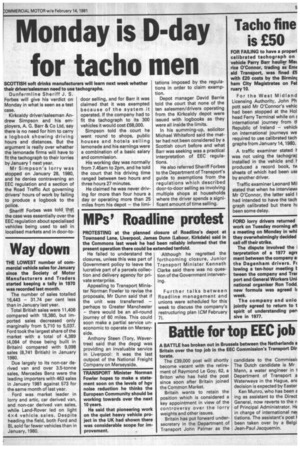Monday is D-day for tacho men
Page 7

If you've noticed an error in this article please click here to report it so we can fix it.
SCOTTISH soft drinks manufacturers will learn their driver/salesmen need to use tachographs. next week whether Dunfermline Sheriff J. S. Forbes will give his verdict on Monday in what is seen as a test case.
Kirkcaldy driver/salesman Andrew Simpson and his employers, A. G. Barr & Co Ltd, say there is no need for him to carry a logbook showing driving hours and distances. But the argument is really over whether the lemonade firms will have to fit the tachograph to their lorries by January 1 next year.
Mr Simpson's lorry was stopped on January 28, 1980, and he denies contravening an EEC regulation and a section of the Road Traffic Act governing drivers' hours of work by failing to produce a logbook to the police. Sheriff Forbes was told_ that the case was essentially over the EEC regulation about specialised vehicles being used to sell in localised markets and in door-to door selling, and for Barr it was claimed that it was exempted because of the system it operated. If the company had to fit the tachograph to its 300 vehicles it would cost £68,000.
Simpson told the court he went round to shops, public houses and hotels selling lemonade and his earnings were a combination of a basic salary and commission.
His working day was normally from 7.45am to 2pm, and he told the court that his driving time ranged between two hours and three hours 27 minutes.
He claimed he was never driving for more than four hours a day or operating more than 25 miles from his depot — the limi tations imposed by the regulations in order to claim exemption.
Depot manager David Barrie told the court that none of the ten salesmen/drivers operating from the Kirkcaldy depot were issued with logbooks as they were all inside the limits.
In his summing-up, solicitor Michael Whiteford said the matter had not been considered by a Scottish court before and what Barr was seeking was a practical interpretation of EEC regulations.
He also referred Sheriff Forbes to the Department of Transport's guide to exemptions from the regulations which described door-to-door selling as involving multiple shops at households where the driver spends a significant amount of time selling.








































































































